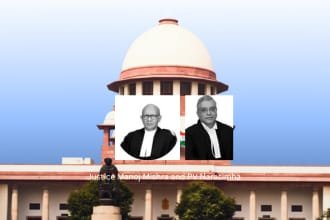In a powerful affirmation of constitutional values, the Supreme Court of India has made it unequivocally clear that hate speech and attempts to spread communal hatred must be tackled with an “iron hand.” This landmark observation came on May 8, 2025, during the hearing of Vishal Tiwari v. Union of India, a public interest litigation (PIL) filed against politicians allegedly making hate speeches in connection with the petitions challenging the Waqf (Amendment) Act, 2025.
Supreme Court Denounces Hate Speech, Upholds Constitutional Morality
A bench comprising Chief Justice of India Sanjiv Khanna and Justice Sanjay Kumar underscored that any act aimed at causing alienation or humiliation of a particular group constitutes a criminal offence and must be addressed accordingly. The Court stressed that hate speech erodes not only the dignity of individuals but also the fabric of a multicultural society committed to equality and fraternity.
“Hate speech cannot be tolerated as it leads to loss of dignity and self-worth of the targeted group members, contributes to disharmony amongst groups, and erodes tolerance and open-mindedness.”
Although the Court refrained from issuing specific directions in the present writ petition, it offered a strong reminder to law enforcement agencies and constitutional authorities to act against hate speech in a timely and effective manner.
The Context: Waqf (Amendment) Act 2025 & Political Provocation
The PIL by Advocate Vishal Tiwari came in the wake of provocative statements allegedly made by politicians amid ongoing challenges to the Waqf (Amendment) Act, 2025. This legislation has stirred significant debate across the political and religious spectrum, with certain public figures making comments that have been described as incendiary and communal in tone.
Tiwari’s plea urged the Court to take cognizance of these statements and initiate suo motu contempt proceedings against BJP MP Nishikant Dubey for his disparaging remarks targeting the judiciary and CJI Sanjiv Khanna. The remarks were made after the Supreme Court intervened in the legal challenges to the amended Waqf law.
Supreme Court Rebukes Dubey’s Comments as ‘Highly Irresponsible’
The Court did not mince words in criticizing the comments made by Dubey. It described his remarks as “highly irresponsible” and “attention-seeking,” pointing out that such statements reflect a lack of understanding of the functioning of constitutional courts.
“Such absurd comments cannot shake public confidence in the judiciary,” the Court observed, choosing not to take coercive action but making its disapproval abundantly clear.
This balanced yet firm response from the apex court sends a strong message: judicial independence cannot be undermined by populist rhetoric. The judiciary, while tolerant of criticism, draws a clear line when the comments cross over into contempt or incitement.
Legal Backdrop: Supreme Court’s 2023 Directions on Hate Speech
It is worth noting that in April 2023, the Supreme Court had passed crucial directions mandating all States and Union Territories to suo motu register FIRs against hate speeches, without waiting for formal complaints. The rationale was to prevent hate-driven incidents from escalating unchecked, especially in sensitive communal contexts.
This background adds greater weight to the present bench’s observation. Though no directions were passed in Tiwari’s PIL, the Court has reinforced the legal position that hate speech is not merely speech—it is a punishable offence.
Vishal Tiwari v. Union of India: Key Takeaways
- Case Title: Vishal Tiwari v. Union of India
- Citation: 2025 LiveLaw (SC) 547
- Bench: CJI Sanjiv Khanna and Justice Sanjay Kumar
- Key Issues: Hate speech, judicial criticism, communal disharmony, Waqf Amendment
- Petitioner’s Prayer: Action against hate speech; contempt against MP Nishikant Dubey
- Supreme Court’s Stand: Strong condemnation of hate speech; criticism of Dubey’s comments; no direct action taken
Constitutional Significance: Hate Speech vs. Free Speech
The case brings into sharp focus the delicate balance between free speech and hate speech in a constitutional democracy. While the right to free expression is guaranteed under Article 19(1)(a), it is subject to reasonable restrictions, including those based on public order, decency, and morality.
The Supreme Court has previously held in Pravasi Bhalai Sangathan v. Union of India (2014) that hate speech threatens constitutional values and often leads to targeted violence. The present observations reiterate the judiciary’s commitment to upholding these values amid politically charged atmospheres.
Political Accountability & Judicial Integrity
The episode involving BJP MP Nishikant Dubey also underlines a growing trend of politicians attempting to discredit judicial interventions. While the Supreme Court has opted for restraint in this instance, its firm tone serves as a reminder that public officials are bound by constitutional decorum.
By declining to take punitive action, the Court has perhaps chosen the higher ground, reaffirming that its integrity does not rest on every comment made, but on its conduct, independence, and the rule of law.
Conclusion: A Timely Reminder for All Institutions
The Supreme Court’s observations in Vishal Tiwari v. Union of India are a wake-up call to all stakeholders—legislators, law enforcement, media, and civil society. Hate speech, especially when emanating from those in power, is not only dangerous but antithetical to India’s pluralistic ethos.
As cases around the Waqf (Amendment) Act continue to unfold, this judgment could serve as a judicial compass guiding authorities on how to approach inflammatory rhetoric, regardless of political affiliation.
The ruling reaffirms that justice, equality, and fraternity are not negotiable principles—and any attempt to trample upon them will not be met with silence.


